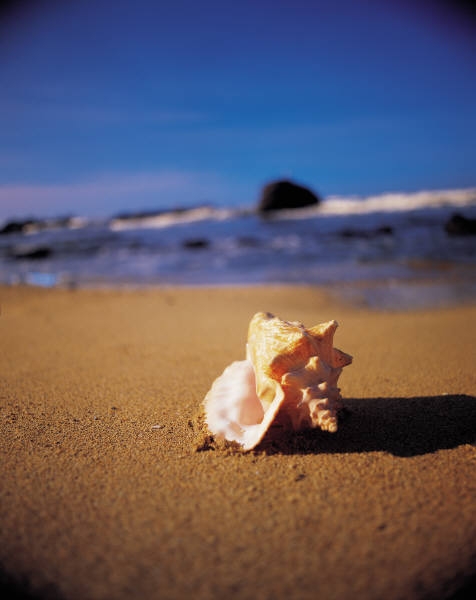One should lie empty, open, choiceless as a beach
waiting for a gift from the sea.
— Anne Morrow Lindberg
Here’s what I know about grief. It can hit you like a sledgehammer coming up behind you, catching you unawares. One minute you are living your life, just as you always have, running errands, reading email, checking off your to-do list; and the next minute, you are lying in a face plant, your head swimming, your world all askew, stunned and disoriented, asking yourself, “What just happened?!”
Or it can creep up on you, like fog moving silently in from the ocean, slowly enveloping your world, particle by particle, changing it to muted shades of gray. At first you feel it coming in your bones, but you push it aside, telling yourself, “It’s fine; the world is just as it was, see? There are my roses, my lawn furniture, the ivy on the back wall. They all look the same.” But deep inside you know, something is changing. And no amount of denial, or hope, or prayers, can keep the angel of death at bay. And one day, you wake up and your world is changed from a place of noise and laughter to one that is oh so quiet; the colors once vibrant and glowing are muffled and diffuse.
This is the hard thing about grief. The way it radically changes your life, thrusts you into a foreign and strange land, completely against your will. No amount of raging or shaking your fist at God will stop it from happening. Like the ancient Jews, you have been exiled from the Promised Land. The world no longer feels like home. You are a stranger inside the walls of your own home. Even your body can feel foreign to you – like a lump of clay that you must somehow energize by force of will. Your eyes open in the morning and you think “Now I will get up. I will put my feet on the floor. I will walk down the hall, open the front door and pick up the paper.” And you think, “How will I get through the next day, the next hour? How is it possible that I am still alive when the one who made my life worth living is gone?”
Your eyes become windows onto the world, your body a space capsule through which you travel through your day. Outside you can see people moving, you can hear conversations and you can remember when you were once like them – so blissfully unselfconscious. But grief has either hit you, or slowly stolen away your life, or both, and you are walking among the land of the living as though you, too, had died.
Sometimes, in your secret heart, you think about ending your pain, of joining the one you lost. “It would be so easy,” you think, “to drive my car right into that train, or over that ravine.” The impulse is there, though you may keep it from everyone else, including yourself. It is a shameful thought, rising unbidden. But some spark of life force pulls you out of it – perhaps the images of your kids or a tiny speck of hope that someday things will be better. So you drive on, over the tracks after the train has safely passed. You soldier on, putting one foot in front of the other, marching through the minutes, hours and days.
Then one day, life begins to creep in again. Like a limb that starts to tingle when the blood flows back into the nerve endings, your life starts to vibrate, imperceptibly at first. You find yourself laughing at a joke; you enjoy eating a full meal; you feel the weight of grief lift a little, giving you a glimpse of the colors that have been hidden from your eyes. It’s hard to say when that will happen, or how it happens, or what you can do to make it happen. It is time? Prayer? Counseling? All of the above? But if you have allowed yourself the time and given yourself over to prayer (even if it is just “help me!”) and talked with someone who can bear witness to your pain, you will start to emerge into the land of the living.
In time, the hole in your heart will not hurt so badly, until one day it will only hurt when you touch it and in some ways that will be a good hurt. “I remember you,” that hurt will say. “I loved you so much and I miss you even now.” And you’ll feel the incredulousness of grief again, the “how could this happen?” aspect of grief. But in that future time, you will have moved on into a new life, one that holds the scars of your wounded heart, but also embraces the love that remains, and even, perhaps, the love of someone new. So hard to imagine at the start of the journey when no one but the one you loved will do.
But this is what I also know about grief — that it passes; not with sledgehammer swiftness, but like the slow retreat of the ocean tide that once lapped at your feet and now has left to reveal the shells, the sea weed, and the small creatures in its wake. I know that grief leaves you changed forever; it know that it leaves you wounded; but I also know that if you let it, grief, like the ocean tide, can give you some unwanted treasures: greater compassion; deeper empathy; stronger relationships. It can force you to become intimately entwined with your fellow humans so that never again will you blithely read a story in the morning paper of someone who has lost a loved one. No, now you will stop and imagine yourself into their lives; you will feel their pain and say a prayer; you will breathe in the hurt and suffering and breathe out peace and compassion. Grief takes but it can also give to those who are willing to receive its hard won gifts.

